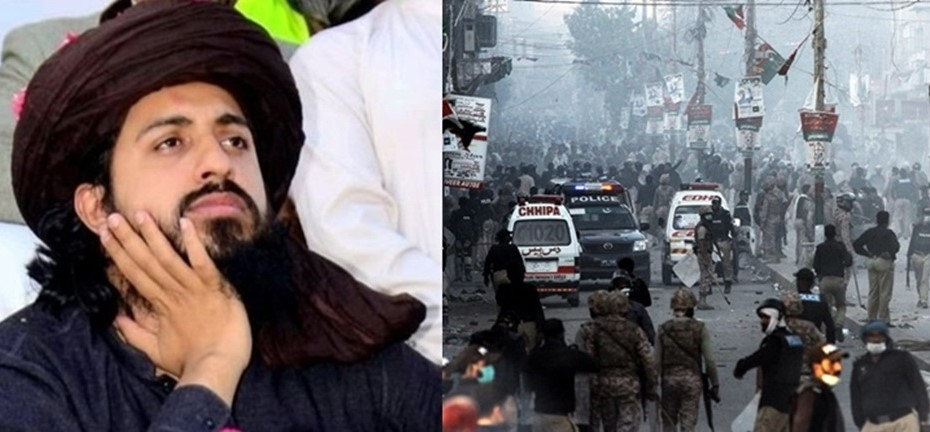

Riots by religious hardliners in Pakistan have brought major cities to a standstill (Photo: IANS)
<p>
<strong>Hamza Ameer</strong></p>
<p>
The current ruling government of Pakistan, led by Prime Minister Imran Khan, may have come with a vision of progress and open-mindedness to create more acceptability of the country in the globe. But it appears that the one challenge which–like previous governments–remains as the toughest for this government is countering the religiously motivated hardline groups who have yet against brought the country to a standstill by chocking major cities in protest.</p>
<p>
Tehreek-e-Labaik Pakistan (TLP), a hardline religious group with massive following across the country, has chocked major cities including the capital Islamabad, as their supporters took to the streets, protesting against the arrest of their chief Saad Hussain Rizvi, who was taken into custody after he threatened to storm the capital Islamabad in the coming days, if their demand of expulsion of the French Ambassador, was not met by the government.</p>
<p>
Angry protesters, since the time of the arrest of the TLP chief, have been staging violent sit-ins, where angry protesters have injured over sixty police officials, while at least 4 police personnel have also been killed.</p>
<p>
The violence has erupted in major cities of Pakistan with radical clerics and their followers have blocked highways, train tracks and chocked inter-city connectivity.</p>
<p>
The TLP has demanded the Imran Khan led government to stand by its agreement, in which, it committed that it would have the French ambassador in Islamabad expelled from the country over blasphemous images and the French President&#39;s controversial remarks against Prophet Mohammad (PBUH).</p>
<p>
Saad Hussain Rizvi, son of the late Khadim Hussain Rizvi, took over control of the TLP, after his father&#39;s death. Khadim Hussain Rizvi, a well-known hardline cleric had brought the country to a complete standstill, demanding the Pakistan government to expel the French ambassador and cut all ties with the French government over what he called, their deliberate attempt to ridicule Islam and the Prophet Mohammad (PBUH).</p>
<p>
An agreement was reached between TLP&#39;s Khadim Hussain Rizvi and the Imran Khan government late last year, in which the government actually had agreed to expel the French ambassador after it passes the legislation from the parliament.</p>
<p>
However, with deadline of the agreement ending, TLP has now taken the government to task again with violent protests, paralysing the country.</p>
<p>
What seriously alarming and worrying in the current situation, is that the government&#39;s writ, in handling, nabbing and restraining the religious hardliners from chocking the country, is nowhere to be found.</p>
<p>
To add more to the surprise, social media videos of the protest have shown many security personnel joining with the protesters to chant slogans, while their job was to disperse the mob and ensure maintenance of peace.</p>
<p>
The government&#39;s approval to meet all demands of the TLP last year, which included parliamentary approval of severing diplomatic ties with France within three months, raised serious questions over the competency of the Imran Khan led government, as many were shocked to see an extremist group, dictating the government on a sensitive foreign policy matter.</p>
<p>
With the protests entering into the third day, Pakistan continues to remain chocked while the government is still in process of formulating a plan to deal with the religious group and its supporters.</p>
<p>
&quot;The authority of the state has seldom been so compromised. It was not just appeasement but abject submission to the lawbreakers and the non-state actors that has undermined the legitimacy of the civil administration,&quot; said senior journalist Zahid Hussain.</p>
<p>
&quot;It was the same policy of appeasement that led the PTI government to concede to the TLP&#39;s demands in November 2020. Indeed, the deal ended the protest but by giving in to irrational demands of the religious group, the government and the state have further weakened their own authority&quot;, he added.</p>
<p>
The latest show of violence, vandalism and extremism by a radical extremist movement of a set of people with a narrow view of religion, has put the civilian government&#39;s ability to uphold the rule of law, under serious challenge.</p>
<p>
And the Imran Khan led government, who in the past has had entered into alliance with similar hardline groups for its political gains to win the general elections, is now being questioned over its wayward approach towards ensuring maintenance of rule of law in the country.</p>
New Zealand's Deputy Prime Minister and Foreign Minister Winston Peters has arrived Kathmandu on his…
The Indian Army and the Mongolian Armed Forces will commence the 17th edition of their…
Pandi Ram Mandavi, a renowned artist from Bastar, Chhattisgarh, was conferred the Padma Shri award…
Taiwan's Mainland Affairs Council (MAC) criticised China on Wednesday for organising two summits for Taiwanese…
The East Turkistan Government in Exile (ETGE) vehemently denounces Mr. Francesco Frangialli, the Honorary Secretary-General…
Chairman John Moolenaar and Ranking Member Raja Krishnamoorthi of the House Select Committee on the…